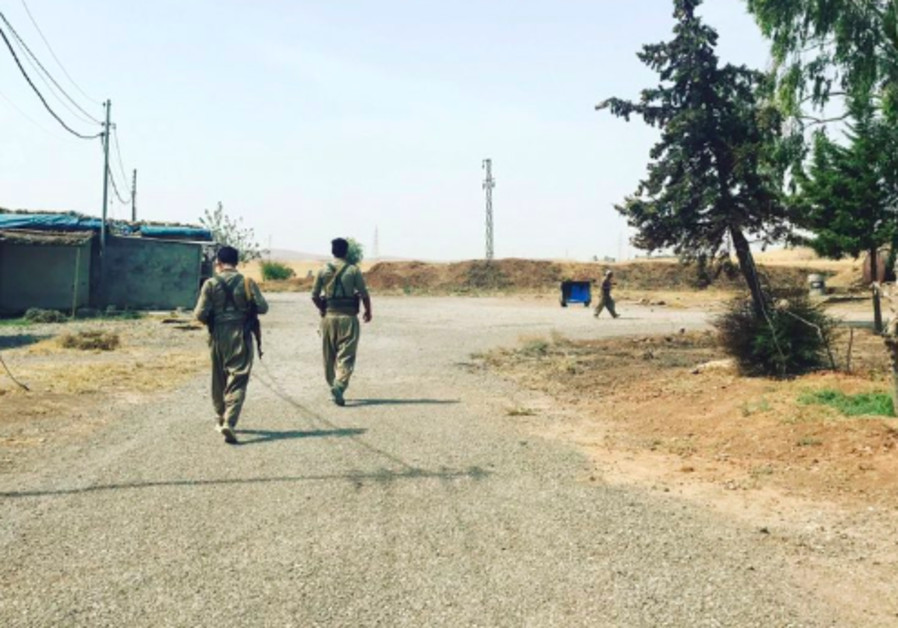Iranian artillery targets Kurdish group in Iraq

Kurdish members of the PDKI patrol a base near Koya. (photo credit: Courtesy)
Kurdish opposition groups said Iranian missiles struck a Kurdish camp in northern Iraq, targeting Iranian Kurds and the Democratic Party of Iranian Kurdistan (PDKI), a group that opposes the Iranian regime.
According to the Koya municipal department of health in a nearby city, at least five Kurds were killed and 30 wounded in the attack. A headquarters of the Kurdistan Democratic Party of Iran (KDP-I), a separate opposition group, was also struck inside Koya where dozens were reported killed and injured.
This is the first missile attack by Iran of its kind against Kurds in Iraq, and the largest attack by Iran against Kurdish groups since 1996. The Kurdish opposition groups have called on the international community to protest Iran’s attack.
Kurdish opposition groups such as the PDKI have opposed Iran’s theocratic regime since the 1980s and fought a long insurgency against the regime. PDKI wants a federal and democratic Iran where Kurds will enjoy equal rights. Since 2015, the PDKI has increased its opposition to the regime, and in the last several months, there have been numerous clashes with dozens of casualties on both sides.
The PDKI often targets the Islamic Revolutionary Guard Corps in Iran. This comes in the context of Washington increasing sanctions on Tehran and the White House announcing other measures to confront Iran in the region. PDKI leader Mustafa Hijri was in Washington in June along with a Kurdish leader from another opposition group called Komala. Hijri hopes the US and others will support the PDKI’s campaign.
With more than six million Kurds in western Iran and evidence that their anger at the regime is growing, Tehran has been striking back. It has carried out assassinations in the Kurdish region of northern Iraq, and it has used artillery against Kurds who seek to cross into Iran. This campaign has targeted PDKI, KDP-I and a group called the Kurdistan Free Life Party (PJAK), as well as the Kurdistan Freedom Party (PAK). The use of medium-range missiles is a new escalation.
The strikes began around 10:45 a.m. on Saturday, and video showed rockets streaming across the sky and huge smoke clouds after explosions were heard near Koya. Reports by locals in Iran said the missile barrage came from near Urmia, at least 200 km. away. Yet Iran has large numbers of different rockets that could fly that distance, including the Fajr-5 and the Fateh-110.
Iran has allegedly shipped rockets to its Shia militia allies in Iraq and also to Syria and Hezbollah in Lebanon. In May, Iranian-backed groups in Syria fired a salvo of rockets at Israel. The attack hit a training base of the PDKI and killed at least two of their fighters, wounding others.
Another missile struck the headquarters of the KDP-I in Koya, hitting a meeting of senior leaders. The current and past general-secretaries of the party were present and dozens of casualties were reported. Civilians were also taken to Koya’s hospital to be treated for injuries.
The precision of the Iranian strikes points to careful planning. Based on interviews with locals, the Iranian regime has been monitoring the Kurdish bases and areas for some time. Kurdish groups have increased security because of this, and they have been concerned that Iran would carry out a raid for months, but the use of precision missiles was a threat they had not foreseen.
Drones were also used in the attack. Recently, Iran has deployed drones along the border to harass Kurdish smugglers and Kurdish opposition groups. Numerous locals reported drones had helped coordinate or monitor the strikes on Saturday.
Civilians fled from the Kurdish camps near Koya into caves. Arash Saleh, the PDKI representative in Washington, called on foreign countries to condemn the attack. Masour Barzani, former president of the Kurdish autonomous region in Iraq expressed concern about the attack, while Dr. Mahmoud Othman, a Kurdish socialist leader, condemned the “act of terror and violation of the Kurdish region’s territorial integrity.”
Iranian regime media has not taken credit for the strikes, and Iraq’s central government had not condemned it by press time.
Join Jerusalem Post Premium Plus now for just $5 and upgrade your experience with an ads-free website and exclusive content. Click here>>






Comments are closed.